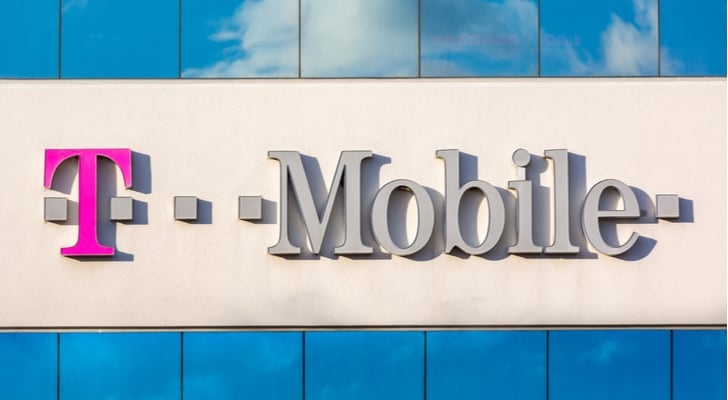T-Mobile US Inc (NASDAQ:TMUS) has ridden the comeback trail for many years now. Its presence has changed the face of wireless and forced the hand of its larger peers. Today, the advent of 5G drives the future of the industry; 5G also likely played a role in the revival of the proposed merger with Sprint Corp (NYSE:S). A successful merger places T-Mobile toe-to-toe with its larger competitors.
However, with the cost of the 5G upgrade, the question of merger approval likely determines how quickly — not if — T-Mobile becomes the premier wireless carrier.
T-Mobile Continues to Beat Its Peers on Growth
T-Mobile had already set its comeback in motion even when most believed the merger with Sprint was off. In the first quarter of 2018, the company added 1.4 million subscribers. Year-over-year revenues rose 8.8% to $10.46 billion. First-quarter earnings-per-share (EPS) of 78 cents beat estimates by 8 cents.
While they still lag Verizon Communications Inc. (NYSE:VZ) and AT&T Inc. (NYSE:T) in subscriber numbers, they enjoy the fastest growth in the industry by far. This gives T-Mobile the momentum as the industry transitions to 5G. News that the merger with Sprint was back on made the already optimistic outlook even rosier.
CEO John Legere Responsible for T-Mobile’s Comeback
The company rebounded under the leadership of CEO John Legere. Since taking over in 2012, he has turned T-Mobile from a lower-tier subsidiary of Deutsche Telekom AG (ADR) (OTCMKTS:DTEGY) to a company poised to catch up to AT&T and Verizon (Deutsche still owns the majority of TMUS stock).
T-Mobile grew its market share by offering lower prices and eliminating practices that profited its larger rivals but annoyed its customers. It provided no-contract plans and offered plans with unlimited data. Today, T-Mobile drives most of the growth in the industry.
Approval Remains Far From Certain for T-Mobile-Sprint Merger
The revival of the proposed takeover of Sprint puts this catch-up process on the fast track. Verizon and AT&T enjoy a 35% and 33% market share respectively. Under the proposed merger, the market share for T-Mobile would rise from over 17% to just under 30%.
The Trump Administration’s desire for industries to have several competitors could hurt the merger’s chances, though. The foreign influences of Deutsche and Softbank Group Corp (OTCMKTS:SFTBF), which owns controlling interest of Sprint, could also cause concern for the U.S. government. Moreover, as our own Dana Blankenhorn points out, AT&T and Verizon will also likely oppose the merger.
But here’s the thing: This consolidation will likely happen with or without the merger. Wireless carriers have to upgrade to 5G to remain relevant long term. All companies will have to spend tens of billions of dollars to complete this upgrade. Mr. Legere pledges T-Mobile will invest $40 billion over the next three years if the merger occurs.
However, Sprint faces a heavy debt load and a dwindling share of the wireless market. This casts doubt on Sprint’s ability to afford the upgrade. Without the upgrade, the company likely goes out of business. Current growth rates indicate most of its customers would switch to T-Mobile. Hence, for these reasons, a merger will likely occur even if a merger does not occur.
The Bottom Line on the T-Mobile Comeback
The T-Mobile comeback is happening, and the revival of the Sprint merger merely determines how fast that comeback occurs. The latest earnings report confirms TMUS blew away its rivals in revenue growth and subscriber growth. Now that T-Mobile is again trying to buy out Sprint, its goal of “providing you with the most outstanding, widespread wireless network possible” comes closer to reality — at a faster pace.
Also, Sprint’s need for a partner works in TMUS’s favor. Sprint’s ability to finance an upgrade to 5G on its own remains in doubt. Although the Trump Administration probably does not want fewer carriers in the market, the cost of the 5G upgrade means a merger of some form will occur eventually.
Low profitability and the high cost of the 5G upgrade will make it difficult for investors to profit from 5G through a carrier. Nonetheless, the best stock performance in the industry will likely come from TMUS stock.
As of this writing, Will Healy did not hold a position in any of the aforementioned stocks.

